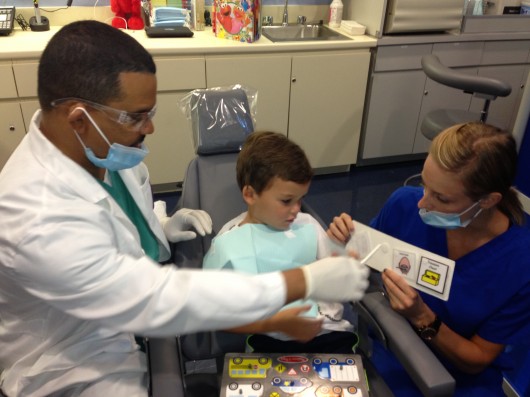NSU Newsroom
SharkBytes
Horizons
This version of NSU News has been archived as of February 28, 2019. To search through archived articles, visit nova.edu/search. To access the new version of NSU News, visit news.nova.edu.
This version of SharkBytes has been archived as of February 28, 2019. To search through archived articles, visit nova.edu/search. To access the new version of SharkBytes, visit sharkbytes.nova.edu.
NSU Offers Free Dental Service for Children with Autism Spectrum Disorder

(L to R) Oscar Padilla, D.D.S., associate professor of clinical dentistry at NSU's College of Dental Medicine’s Department of Pediatric Dentistry, provides dental services to 4-year-old Robert Coulombe. Padilla is assisted by NSU’s Andrea Boucher, DMD.
Stephanie and Robert Coulombe are getting a special kind of dental care offered nowhere else in America.
The 4-year-old twins are receiving dental treatment from Nova Southeastern University’s College of Dental Medicine that’s customized for children like themselves, who have been diagnosed with autism spectrum disorder (ASD).
The college is offering free dental services for students with ASD at NSU’s Baudhuin Preschool at the Mailman Segal Center for Human Development.
“The NSU dentists are very personable with my children,” said the Coulombe children’s mother, Sylvie Trudeau. “My kids are happy to see the dentist because they get VIP service. When you have children with a disability, they cannot be treated the same way as other kids.”
NSU dentists and behavior analysts at Mailman Segal have collaborated to develop a treatment plan tailor made for children with ASD by using the principles of Applied Behavior Analysis (ABA). ABA modifies behavior for learning or treatment.
The plan consists of using tools to help children with ASD feel more comfortable and prepared for dental treatment. These tools include:
• iPad video – It’s used as video modeling to show children the treatment process and demonstrate desired behavior during treatment. The video is shown twice, once during consultation and again during treatment.
• Task strip – It’s used to display the steps of treatment, from beginning to end, to show children that their dental care involves a routine which has an ending.
During the actual treatment – which can be for cleanings, fillings, extractions, X-rays, etc. — the child is given breaks and allowed to play games on an iPad. After treatment, they get to choose a toy from the treasure chest.
“The children like routines, so we provide that,” said Oscar Padilla, D.D.S., associate professor of clinical dentistry at NSU’s College of Dental Medicine’s Department of Pediatric Dentistry. “So far, 100 percent of the patients surveyed responded positively. Parents have said they appreciate us treating their children as people.”
In addition, post-doctoral dental students who are doing their dental residency at NSU are also being trained to provide specialized care for children with ASD.
The autism dental service is made possible by a $2.5 million federal grant from the Health Resources and Services Administration. When the 5-year grant ends, the College can apply for a renewal, said Romer Ocanto, chair of the College’s Department of Pediatric Dentistry.
This grant is important, Ocanto explained, because resident dentists and post-doctoral students are able to use behavioral analysis techniques while treating these children in the dental office at a location that the children are familiar with, like there school.